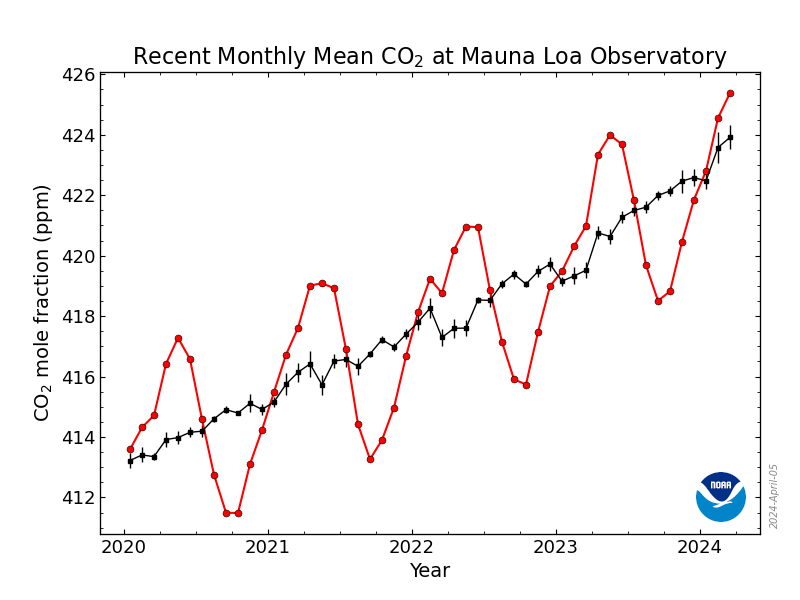I heard at Democracynow.org about the recently released IPCC report 2013.
1) Reading the latest Nat Geo, they mentioned the number of 400 ppm of CO2 concentration. I thought it was too soon, technically. Not last winter. I first found a nice discussion at Lester Brown's Earth-Policy's site, then found my way to the NOAA's site.
2) This morning (Sat. 9-29) I heard Amy Goodman's broadcast about Greenpeace and Canadian Tar Sands protests in which she mentions Canada's conservative Harper government. I'd ultra conservative, or even reactionary. I found a strong piece by the Guardian's Stephen Leahy, below.
3) Greenpeace video (and collection), this one about oil pollution in Siberia by Gazprom... http://www.youtube.com/watch?v=fO-1Su0C5KI&list=UUTDTSx8kbxGECZJxOa9mIKA

,,,CO2 emissions in developing countries surpassed those from industrial countries in 2005 and have since continued to soar. China’s carbon emissions grew by 44 percent since 2007 to 2.4 billion tons in 2012. Together the United States and China account for more than 40 percent of worldwide emissions. Emissions in India, home to more than a billion people, overtook those in Russia for the first time in 2008. From 2007 to 2012, India’s emissions grew 43 percent to reach 596 million tons of carbon. Carbon emissions in Indonesia, another fast-growing economy, have exploded, growing 52 percent to hit 146 million tons in 2012.
Although emissions from developing countries now dominate, the industrial countries set the world on its global warming path with over a century’s worth of CO2 emissions that have accumulated in the atmosphere. Furthermore, emissions estimates discussed here include only those from fossil fuels burned within a country’s borders, meaning that the tallies do not account for international trade. For example, emissions generated from producing goods in China destined for use in the United States are added to China’s books. When emissions are counted in terms of the final destination of the product, the industrial countries’ carbon bill increases.
On a per person basis, the United States emits 4.4 tons of carbon pollution—twice as much as in China. The highest per capita carbon emissions are in several small oil and gas producing countries. In 2012, Qatar spewed out 11 tons of carbon per person. Trinidad and Tobago is next with 9 tons of carbon per person, and Kuwait follows at 7.5 tons.
Fossil fuels are not the only source of CO2 emissions. Changing the landscape, for example by burning forests, releases roughly 1 billion tons of carbon globally each year. Brazil and Indonesia have high levels of deforestation and are responsible for much of the current carbon emissions from the land.....
2) Canada has been under its Prime Minister Steven Harper for some years. He's a conservative who's a lot like George W. Bush. A UK Guardian article from 2010 cites a report by a coalition of Canadian NGOs that is shocking, but typical.
"....
Canadian government 'hiding truth about climate change', report claims
Canada's climate researchers are being muzzled, their funding slashed, research stations closed, findings ignored and advice on the critical issue of the century unsought by Prime Minister Stephen Harper's government, according to a 40-page report by a coalition of 60 non-governmental organisations.
"This government says they take climate change seriously but they do nothing and try to hide the truth about climate change," said Graham Saul, representing Climate Action Network Canada (CAN), which produced the report "Troubling Evidence".
"We want Canadians to understand what's going on with this government," Saul told IPS.
Climate change is not an abstract concept. It already results in the deaths of 300,000 people a year, virtually all in the world's poorest countries. Some 325 million people are being seriously affected, with economic losses averaging 125 billion dollars a year, according to "The Anatomy of a Silent Crisis", the first detailed look at climate change and the human impacts.
Released last fall by the Geneva-based Global Humanitarian Forum, the report notes that these deaths and losses are not just from the rise in severe weather events but mainly from the gradual environmental degradation due to climate change.
"People everywhere deserve to have leaders who find the courage to achieve a solution to this crisis," writes Kofi Annan, former U.N. secretary-general and president of the Forum, in the report.
Canadians are unlikely to know any of this.
"Media coverage of climate change science, our most high-profile issue, has been reduced by over 80 percent," says internal government documents obtained by Climate Action Network.
"This government says they take climate change seriously but they do nothing and try to hide the truth about climate change," said Graham Saul, representing Climate Action Network Canada (CAN), which produced the report "Troubling Evidence".
"We want Canadians to understand what's going on with this government," Saul told IPS.
Climate change is not an abstract concept. It already results in the deaths of 300,000 people a year, virtually all in the world's poorest countries. Some 325 million people are being seriously affected, with economic losses averaging 125 billion dollars a year, according to "The Anatomy of a Silent Crisis", the first detailed look at climate change and the human impacts.
Released last fall by the Geneva-based Global Humanitarian Forum, the report notes that these deaths and losses are not just from the rise in severe weather events but mainly from the gradual environmental degradation due to climate change.
"People everywhere deserve to have leaders who find the courage to achieve a solution to this crisis," writes Kofi Annan, former U.N. secretary-general and president of the Forum, in the report.
Canadians are unlikely to know any of this.
"Media coverage of climate change science, our most high-profile issue, has been reduced by over 80 percent," says internal government documents obtained by Climate Action Network.
http://www.theguardian.com/environment/2010/mar/18/climate-change-canada

 PDF Version
PDF Version
No comments:
Post a Comment